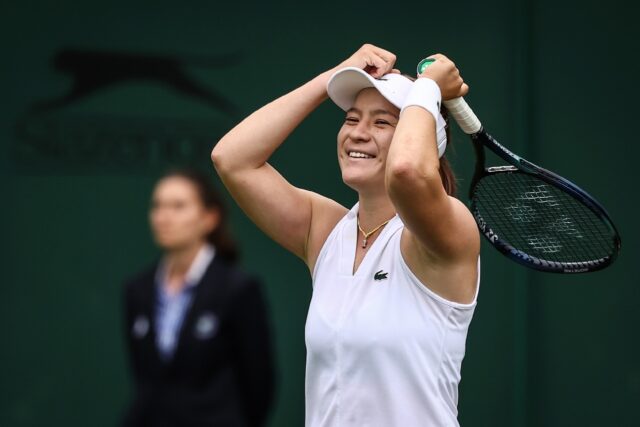Lulu Sun has taken a long, winding road to the Wimbledon last 16, from New Zealand via China, Switzerland, the United States and Slovakia.
On Friday she became the first woman from New Zealand in the Open era and first overall since 1959 to reach the fourth round at the All England Club.
The 23-year-old’s tennis journey began in Te Anau on her country’s South Island, a peaceful town where the population hovers around the 3,000 mark.
“Practically more sheep and deer than people,” she joked after seeing off China’s Zhu Lin 7-6 (7/4), 7-6 (8/6).
Sun, ranked 123 and having had to qualify to make her Wimbledon debut, has a Chinese mother and a Croatian father. Her stepfather is German-English.
After spending her first months in New Zealand, she and her mother moved briefly to Shanghai before she was raised in Switzerland from the age of five.
Her pursuit of a college education took her to Texas, where she studied international relations.
She now divides her time between the US and Slovakia, the home country of coach Vladimir Platenik.
Sun speaks three languages fluently — English, French and Chinese — and likes that she has inherited her family characteristics to take on court.
“Chinese obviously from my mum’s side, so very disciplined, hard-working. From my dad’s side, Croatian, he’s from the seaside, so very laid back and calm. I guess that’s a good combo,” she said.
“I think also from my mum’s side I get that feistiness and competitiveness.
“From New Zealand I get that adventure side come out of me. I’m really happy to be able to have so many cultures and backgrounds with me even though sometimes I’m not 100 percent in each one. It’s impossible to be.”
Sun caused a sensation in the first round at Wimbledon when she knocked out Chinese eighth seed and Australian Open runner-up Zheng Qinwen.
In the last 16, she will face either Greek ninth seed Maria Sakkari or Britain’s former US Open champion Emma Raducanu.
Like Sun, Raducanu also has a Chinese mother.
Win or lose in the fourth round, Sun said she will keep combining tennis with learning. On the to-do list, more language skills.
“I was learning a bit of Spanish. I recently was very interested in learning Japanese, but then I’m now learning Korean because I thought that if I learn the grammar part of Korean, it would be similar to Japanese and that would help,” she explained.
“It will be definitely tricky. Sometimes my English doesn’t even work. That’s what happens when you speak multiple languages.”

COMMENTS
Please let us know if you're having issues with commenting.